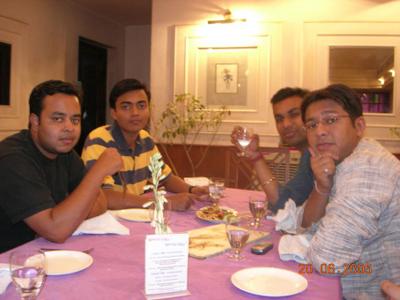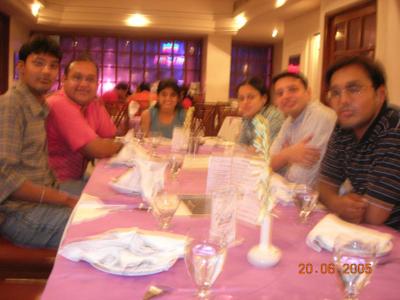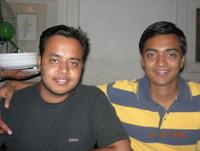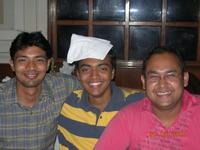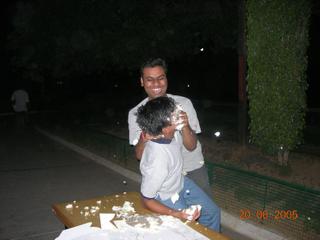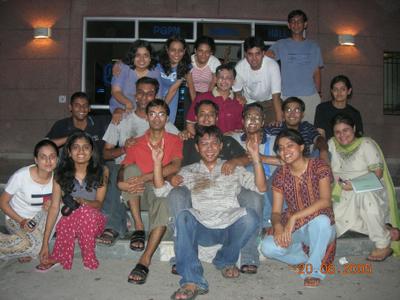Certainly one of the best profs who teach in MDI. Its not just his expertise and succesful experience in value investing (in stock market) that makes him so, its also his ability to share them so well with us. It is undoubtedly the most popular course here. The course is called "Behavioural Finance and Business Valuation" and now, he is teaching us social psychology as a foundation.
He is CEO of Tactica Capital Management Private Limited. The articles he gives us to read, the books he recommends and above all, his presentations, the videos and the movies he shows us as part of the course are simply amazing. I look forward to becoming a value investor when I have earned enough money.
Following is his reply to a mail of an alumnus of MDI a few years before. His story is certainly inspiring and I find it very worthy that I have put it here.
-----Original Message-----
From: Sanjay [mailto:(####)]
Sent: Thu 11/18/2004 12:41 PM
To:
Cc:
Subject: My Own Story
Some time ago, Kumar Saurabh sent me a mail in which he asked me some personal questions that got me to reflect on my life. I then wrote a long mail to KS in which I tried to give answers to his questions. Subsequently, with KS's permission, our mail exchanges were posted on my yahoo group.
I am now posting the same exchange between KS and me over here. Read KS' mail first which is at the bottom and then my reply.
Some minor mistakes relating to dates were subsequently found but I have chosen not to make any changes.
SB
From: Sanjay
Date: 10/04/04 00:12:20
To: [####]
Subject: Re: Not Urgent
Hi Kumar:
I wonder if you know about feedback theory? In a negative feedback loop, like a thermostat geyser, suppose the maximum level of temperature is set to 90 degrees. Assume that the geyser is on and the water is getting heated. Soon enough the temperature will rise to 90 degrees and the sensor in the thermostat will sense this and will act by cutting off the circuit. The water will now stop getting heated and will slowly but surely cool. Sooner or later it will reach the minimum level of set temperature, say 60 degrees - whereupon the sensor in the thermostat will sense this and will re-connect the circuit and the process will start all over again. Negative feedbacks loops like this one are stable i.e. they restore stability. A whole lot of things around inside us are negative feedback loops - stuff like our own body temperatures, our digestive system, our, respiratory systems. In fact negative feedback loops are visible all around in nature as well.
Now think of a positive feedback loop. Suppose that the sensor instead of stopping the heat from getting hotter, when the temperature reaches 90% starts to send even more heat energy in the water. This will ensure that the process of heating accelerates. Of course, in this case, the heating cannot accelerate indefinitely because it will break some laws of physics if it did but there are many other feedback loops which can last for a long long time.
Your reference to the profit multiplier model reminded me of this theory. If you really think about it, all business successes have an element of positive feedback loop in them. My own success has followed a positive feedback loop. But I didn't design it like that. I just worked out that way. Its only now that I am recognizing these patterns in success that you are also recognising and given that you are much younger than me, you are way ahead of me in thinking along the right track . . .
I'd like to tell you my story which is quite fascinating. I was not very good in my studies in school. The only subject I really liked was math and even there I had terrible teachers. So school (DPS, Mathura Road) was a disappointment. In 1983, I entered Kirori Mal college to do my B.Com and started liking the subjects I was studying - accounting, economics, law etc. My interest in academics started to increase. I also got myself a girlfriend, who was also my first student (she studied accounting from me in college) so you can understand why I got attracted to teaching! After we finished college, in which did I extremely well, I joined Price Waterhouse as an articled clerk in 1986 and my girlfriend joined some other local CA firm to pursue the same profession as me but she found she hated it, so she moved on to do a Masters in Finance and Control in University of Delhi. I started to love accounting and auditing and learned a lot about how businesses perform, or d o not perform, by going to audit many clients over the three years I spent at PW.
Because my love of the subject like accounting, economics, law, finance, auditing had grown quite a bit by then, I did well. I passed both my CA exams - the intermediate and the final in the first attempt (which is quite a feat) and in the minimum possible time. Even before I completed my statutory article period of 3 years, I got a job offer from American Express. At that time Amex was the place to get work for CAs. Giving into social proof, I took the plunge and joined Amex sometime in June 1999. By December I had quit my job with no other job in hand. Obviously, this will give you an idea of my nature. Whenever I have made the big decisions in my life by deciding to do something or to run away from something, I have never really had a plan B. In case of Amex, I just knew I had to quit (Big decision # 1). The job was quite rotten, and I came out of it swearing that I will never work for anyone ever again. So, in a sense, I have much to thank Amex fo r!
I went back to my favourite partner at PW and told her that I'd like to go abroad to study and until I got a chance could I come back to PW? She said, sure, why not. And so I found myself back in PW as an audit officer. By then, of course, I had been applying to many colleges including the LSE. Also, by then, seven years had gone since I had got this girlfriend towards whom I was much devoted, and since I had a job, we now decided to get married. That's when all hell broke loose as often happens with young couples who want to get married without the consent of their parents. In our case, the problem was with my parents. Well, again I knew I was taking the right decision. (Big Decision # 2).
After a lot of agony, I finally got married in Feb 1990. For a while I thought my troubles were now over, but little did I know that they had just begun! My house became an Ekta Kapoor TV serial. Soon, I moved out of my parents' house with my wife and took an apartment on rent in the far end of east Delhi. We had no money. We slept on the floor. No bed, no chair, no furniture, no fridge, no TV, no AC but plenty of love to share. Life was still hell, though.With both of us working hard, often reaching home at 10:30 PM- the stress of family tension, poverty, and a whole lot of factors made life pretty miserable.
Then, one fine day, I got a letter from the LSE telling me that not only had I got admission for an MSc course in Information systems, but also had I been granted a scholarship to pay for my fee. There was no scholarship offered for living expenses. By now, you can probably guess as to what decision I would take. I just knew I had to go to London - living expenses or no living expenses. (Big Decision # 3)
So, in September of 1990, a few months after I was married, with no money, I arrived in cold London with my wife and plunged into my studies. But what about my living expenses, you should now ask? My scholarship only paid for my fee and I had to pay rent and we also had to eat. We had no savings.
My wife took up a job as a tiller girl in a grocery store. A Masters in Finance from University of Delhi found herself scanning groceries for customers and packing their shopping for them. If she ever complained, I never heard it.
Both of us also took part time jobs working in Burger King. Yes, I and my wife made burgers earning the minimum wage of 4 pounds an hour less deductions. And, oh, the burger making part was the best part. There was the other part like cleaning the toilets, sweeping floors, clearing tables, listening patiently to screaming customers and many similar activities which made making burgers seem like heaven!
One year went by and I finished my course at LSE. Incidentally, I never actually studied much of Information systems. I went and sat in the finance classes where I encountered, unsurprisingly the efficient market theory. Then on one of the most important days of my life, although I do not now remember what day it was, I read in the Financial Times, an article about a strange fellow called Warren Buffett who made money in the stock market by keeping away from the market. The positive feedback loop had just begun.
Within a few days of reading about Buffett, I knew that I had found a meaning in my life. (Big decision # 4). I simply knew that his ideas were learnable and that they would work in India. But I also knew that I hardly knew anything about investing using Buffett's philosophy. And so, I went berserk about learning everything I could about this fellow. I read and read and read. I wrote to him asking him to send me his annual reports (there was no Berkshire website in those days). His reports arrived in four days. It was as if he was waiting for my request. He could, perhaps, almost hear me shout, "Teach me, what you know" and he responded by sending me those reports. I still have them with me, of course, and if you see them you'll find every page has been underlined, highlighted, with extensive notes questions etc written pencilled in the columns. And the more I read about Buffett, the more sense he made to me. Of course, when you read Buffett, you eventually discover Graham and once you discover Graham, he can keep you busy for a couple of years. I now knew my education was woefully incomplete so I decided to stay back in London to learn everything I could about value investing. I took up a part-time job as a research assistant with an academic publishing company. This job came with certain privileges - such as a photocopying machine with unlimited paper, and toner, and access to the best libraries in London. I furiously copied all the books on value investing that I could get my hands on. The money I earned was sufficient to keep us alive and that was all I wanted anyway at that time. We stayed in London for a total of three and a half years. Then, suddenly, one fine day, I told my wife that we're going back to India. She was shocked. How did I decide to come back? I just knew I was now ready to come back to India. (Big decision # 5).
And so about 10 years ago, we returned to India, with Rs 3 lacs as our total savings, lots of wisdom, and a daughter. And what did I do when I returned? Take up a job? No, the pain from the Amex experience will take many decades to go away, so a job was out of the question. So, despite the advice from parents and my best friends, I decided to float a company. I approached my closest friends and relatives and asked them to invest in it. I think they invested more out of pity than for having any confidence in me. Remember, I had no track record. I didn't surprise them. By 1996, the money had shrunk by 40%. And that of course is the most wonderful thing to happen to someone who wants to make a career out of value investing - losing your friends' and your relatives' money. Believe me, its the best lesson in getting a risk averse nature. I had to start all over again. I corrected my mistakes and remade the portfolio following Graham's advice. And I have never looked back since t hen.
As mentioned earlier, when I returned to India 10 years ago, my total savings were Rs 3 lacs. Today, I can say with confidence that I am financially independent. To use Robert Kayosaki's (author of Rich Dad Poor Dad) words I no longer work for money. Rather, I find myself in a position where money works for me. I have given up all my clients. The money I get from MDI is not even 1% of what I now earn in a year.
It wasn't like this a few years ago. In 1996 when I went to IMI, I needed to find some way to feed my family while I was practicing value investing. Teaching was the last thing on my mind. I had already started writing columns for the Investor's Guide in the Economic Times. One day, one reader of my column, who was teaching at IMI made the effort of calling ET, got my phone number, and called me up. He asked me to come and see him. I went to see this person and he convinced me to come teach one class. I must confess here that till then I had never spoken a word in my life while standing on a stage - not in school, not in college, not in PW or LSE or anywhere. I am by nature an introvert. I hate going to parties. I probably go to less than 3 parties in a year. The whole idea of doing public speaking was so scary that I don't know how I said yes to this person. He must have used some weapon of influence - I don't remember anymore. Incredibly, I also don't remem ber who this person was. His memory has faded away.
Anyway, I prepared many days for that one lecture, and went and delivered it in a total state of panic. In those days we had to use transparencies instead of powerpoint, and that was useful because one could actually talk without having the need to look at the audience, which to me was less preferable than to go alone in a graveyard at night. The lecture was well-received, and I was now on my way to becoming a part academic, part value investor - following the footsteps of Graham. So, after all this, Kumar, I have now provided you with the answer to your first question.
Over the next few years I taught at IMI, Fore School, and ICFAI Business School. There were days when I would teach 3 hours in Chattarpur branch of ICFAI and then go to Kirti Nagar branch and deliver the same lecture another 3 hours. Talking for six hours and driving 120 kms in June in Delhi in a car which had no AC, and doing it twice a week was some feat, I guess. When you have to find a way to feed your family and you don't want to compromise your cherished ideas (in this case of not working for anyone but myself), life makes you hard enough to endure pretty much anything.
So, my decision to teach was driven by the need to feed my family. Of course, once I started to teach, I started to really enjoy it. Remember my experience of teaching back in Kirori Mal College. I guess I was cut out to be a teacher, after all. Over the years, I found that there was a great deal of synergy in what I was teaching and what I was practicing. Teaching makes me focus better on my work and my work provides me with cases to discuss in class. In other words, a positive feedback loop is in operation.
How did I shift to MDI? Well over the years I became better and more confident, and one day a friend told me that he knows a professor at MDI (now retired). I had heard about MDI, and I knew that it has a lovely campus, and I enjoyed driving. Now I know this sounds silly, but the desire to drive to MDI was one important reason for my approaching it in the first place! I love cars. And since I work from home, I hardly get a chance to drive long distances. So, incredibly as it may sound Kumar, its is true that you and I met probably because of my desire to drive!
Of course, my experience of teaching at MDI was great from the very beginning. But, over the years, as I look at the course outlines and the slides I displayed, I can see how I have become better and better. There's nothing unusual here. One should get better and better over time in any activity that requires brain power. I found that my professional experience grew, I could use them as cases in my class and the process of preparing for my classes forced me to study which generated more ideas. The positive feedback at work again. Indeed, some ideas started coming from the students themselves. In 2001, one student, using the ideas of identifying cheap stocks taught by me, submitted a project report on Trent as a cash bargain. I instantly recognised the value of the idea and implemented it by buying the stock. What was I to do? I teach the subject. I teach how to recognise opportunities. If someone brought one to me, should I ignore it? Does the fact that its a student project report make it worthless? And if I ignore it, am I being smart or foolish? Well, I decided not to ignore it. I went and bought 1.5% of the company at Rs 65 per share. And, of course, I made a killing.
The Trent experience made me realise two things: (1) security analysis is learnable; (2) there are huge synergies in teaching it well and and practicing it. The experience, however, made me a bit uncomfortable. Was I using my students to generate ideas for personal gain? It was a problem which was difficult to solve. There were only two solutions: (1) ignore good ideas generated in class but talk about good ideas generated out of class, which to me looked rather foolish; or (2) give public recognition to the person who floated the idea with the effect that he/she will get confidence about his/her own abilities and can also be used as a role model for other students. I chose (2) and it seems to have worked. There are several ex-students, including you, who feel that my approach of practicing security analysis is workable and learnable. Indeed my adoption of (2) has, in my view, accelerated the positive feedback loop.
And then, Lollapalooza happened. As you may know, the idea was not mine at all. It was all Sumit Khanna's idea. After passing out from MDI, he sent me a mail in which he said that he had created a yahoo group in which all the SABV students of last year were members and he wanted me to be a member. Instantly recognising the value of Sumit's idea, I agreed. But, within two days, I felt, why are we limiting to only those who just passed out? And why are we limiting to only MDI? If I was the common thing in the group, then surely the presence of many other people who were my ex-students, and who, by now had valuable experience, might be interested in becoming part of Sumit's group. They may have something to offer. I wrote a mail to Sumit telling him what I felt. In that mail I suggested that we create a new yahoo group in which we invite only my students including past students from MDI and other places. Because the group was to include non-MDI students, I suggested we have a diffe rent name (the earlier group was called wowmdi). Sumit readily agreed and suggested a list which, of course, had the name, Lollapalooza. So, this is how Lollapalooza was born. It wasn't planned by me or anything. It just happened, pretty much like everything else in my life happened, as described above.
I want to mention here the role of a very dear friend and colleague of mine in my ability to instantly recognise the potential of Lollapalooza. This friend is a deep value investor like me and is probably the smartest man I ever met. Incidentally he's a school dropout and has learnt to survive and prosper pretty much as I have. In 1998, this friend, who was then unknown to me approached me after reading some of my articles. He came and met me and gave me the annual reports of three companies - Kirloskar Oil Engines, Unichem Labs, and IVR Infrastructure (the name of this company was different then). He owned stocks in all the three companies and he wanted my advice on his investments. He also wanted to know what I found attractive in my own portfolio. When he went away I thought along the following lines:
"This fellow is a school drop out. What the hell does he know. I am a CA, a MSc from LSE and I am an expert on investing as my ET articles vouch. Investment ideas are intellectual property. They are extremely valuable. Why the hell should I share my ideas with him? And if I am not sharing my ideas with him, I also see no point in looking at these annual reports." Well, that mistake cost me tons of money because each of those stocks became multi-baggers.
But I didn't know this fellow well enough. He kept on calling me. Then he started to advice me. He told me in 2000 to keep away from IT sector. After the great crash I realised that I had made a terrible mistake by ignoring him and I apologised to him, and he forgave me. He told me one sentence that I'll never forget: He said:
"Bakshi, always remember, that knowledge grows through sharing."
By now I has also learnt how utterly simple this friend is. He's now probably worth more than Rs 50 cr. He lives in a middle-class apartment in Chennai. He drives a Honda City. I can continue writing about him for hours, but maybe on another day. Right now, I just want you to know the most important thing that he patiently taught me was that knowledge grows through sharing. I now spend at least an hour a day with him sharing ideas.
It really changed my view of the world and my view of myself. I realised that I had been a total fool in thinking that I was the master of the universe. I changed. I started talking about my investment ideas with other like-minded people. The process continued until I reached a stage in my life when I was creating like-minded people in the classroom. So, when Lollapalooza arrived, I instantly knew that knowledge shared selflessly will increase. And, in my view, it has.
I learnt one more lesson from my friend. He taught me that if you do good things, you get them back with interest. And if you do bad things, you get them back with interest too. God had, in effect, an yield curve with an interest rate implied from deeds we do and the rewards/punishments we get. And that advice has worked for me in life. I have found this over and over again that some people who only want to take but never give suffer while those who give, also receive, and with interest. And that pretty much explains part of the reason as to why I go and teach security analysis. I am often asked by friends who have seen my track record as to why am I telling others how to do it? Well, I guess, you got my reason now. The other reason, of course, is that I simply love it and I feel obligated to give back to society from which I have taken so much.
As of now, I don't know whether Lollapalooza was my big idea # 6. (In fact, it wasn't even my idea.) Time will tell, but it has the common elements that was present in all of the previous ideas - it was not deliberately planned by me. But when it arrived, I instantly knew I had to do it. I am reminded of a wonderful passage in the autobiography of Herb Simon, which I reproduce below:
"I have encountered many branches in the maze of life's path, where I have followed now the left fork, now the right. . . .In describing my life as mazelike, I do not mean that I have a large number of deliberate, wrenching decisions to go off in one direction or another. On the contrary, I have made very few. Obvious responses to opportunities and circumstances, rather than studied decisions, have put me on the particular roads I have followed"
So, as you can see, Kumar (if you are still awake that is), my life has largely followed the above Simon quote. So that was my story so far, You can seek answers to your questions from what I have written above, or you can look elsewhere, or both. It's obviously, up to you.
Regards
Sanjay Bakshi
http://www.sanjbak.com/
-------Original Message-------
From: Kumar Saurabh
Date: 10/01/04 12:49:01
To: [####]
Subject: Not Urgent
Sir,
I was recently reading a book on profit models and I found one that fit your profile. It talks about using one skill to make it big, its called the profit multiplier. I realized that it roughly fits you, you make money for yourself by investing your own savings, also manage other people's money which yields fees, teach at MDI, which would net you some more money.
Finally, you have pieced together a research unit with ZERO cost (or minimal). This essentially means that now you have a skill, which you can use in decreasing quantities since now you have a larger body of
similar thinking individuals. I assume at least 10% of the ideas generated from the e-groups would be worthwhile for you. So now you earn even more with the added advantage of having the option to work
less (very Bertrand Russell like) or the chance to increase your gains further by maintaining your work schedule.
I truly see the mastery in what you do. Now I have a few questions. Please do not be offended, that is not my intent, I am simply evaluating a few aspects of a professional life, which will form the very core of my philosophy for life.
Q1. Was the decision to teach at IMI taken with the consideration of multiplying your profit or for the sheer exhilaration that comes with teaching? If neither what was the factor that drove you to teach first at IMI then at MDI?
Q2. How did you get an idea to start the business you run now and what were some of the things that formed the basis of your decision?
The second question will probably take a little time to answer, let me explain why I'm asking this particular question.
Recently a friend, who works at Wipro, informed me that their head, a Vivek Paul or somesuch earns Rs 5 crore annually. This really got me thinking, if the man who understands business better than most, is
exceptionally intelligent, a great people person among many other qualities he would have to possess to be at such a position was paid what seems like not all that great a sum. Is it really worthwhile to
stay in a job knowing that I will perhaps never be as good as him and hence would never earn even a fraction of that amount of money?
In this case does it not make sense finding out what I'm good at or finding out what people are good at and using their skills to multiply my profits through a business run by me?
This is not a very urgent query; please take your time in answering them. I also understand that you may not want to answer some questions, so please feel free to strike either or both of them off the list.
Inquisitively,
Kumar S.
PS: The Russell reference is to an essay, 'in praise of idleness', a must read if you haven't come across it.
